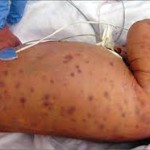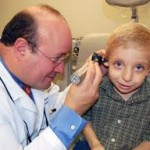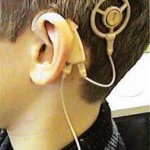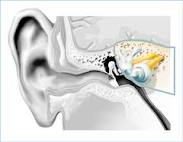When there is an uneven damage to the inner ear and hearing is not entirely lost, you may have nerve deafness. Loss of sensitivity to various tones, particularly high-pitched ones, may be experienced if you suffer from thus type of hearing loss. Nerve deafness makes the normal hearing zone a lot narrowed. This is usually manifested by the difficulty of patients to distinguish the consonant sounds with high tones. The patient with nerve deafness has a hard time in hearing words if there is a noise I the background.
In nerve deafness, the hearing nerve trunk is not the focus of the damage. Nerve deafness is also known as sensorineural hearing loss. The hair cells or the inner ear are destroyed or damaged in this condition. It may be a structural or a functional defect. If the hair cells are damaged, information is not effectively sent to the auditory nerve. The extent of hearing loss depends on the amount of damaged hair cells. If there are that many damaged hair cells, there will be profound or severe nerve deafness. Hearing aids won’t help the patient anymore. Cochlear implants may be more significant solutions. Read on and be more familiar with nerve deafness:
1. Causes
 This uncomfortable condition may have several causes. The infant may have acquired it from birth, wherein the acoustic nerve is malformed or missing; occurrence of chromosomal syndromes: CRS (congenital rubella syndrome); and congenital cholesteatoma (squamous epithelium). The acoustic nerve is found inside the cochlea. Loud noises above ninety decibels could also be a cause because these can traumatize the inner ear. Physical injury or trauma can also bring about nerve deafness. It is also possible for viral infections to cause damage to the inner ear (e.g.: meningitis, measles, mumps, syphilis, or chicken pox). Autoimmune diseases can potentially cause damage to the cochlea. Other conditions such as Muckle-Wells syndrome, presbycusis, ARC, HIV/AIDS, adenoids, fetal alcohol syndrome, Chlamydia, and premature birth can also cause nerve deafness. If the patient is undergoing chemotherapy, then there is a high risk of acquiring nerve deafness. Old age can also be a cause, considering the progressive degeneration of the inner components of the ear. But this happens slowly, though. There are also some medications that may cause damage to your ear such as sildenafil, macrolide antibiotics, NSAIDs, aminoglycosides, diuretics, hydrocodone, OxyContin, and Vicodin.
This uncomfortable condition may have several causes. The infant may have acquired it from birth, wherein the acoustic nerve is malformed or missing; occurrence of chromosomal syndromes: CRS (congenital rubella syndrome); and congenital cholesteatoma (squamous epithelium). The acoustic nerve is found inside the cochlea. Loud noises above ninety decibels could also be a cause because these can traumatize the inner ear. Physical injury or trauma can also bring about nerve deafness. It is also possible for viral infections to cause damage to the inner ear (e.g.: meningitis, measles, mumps, syphilis, or chicken pox). Autoimmune diseases can potentially cause damage to the cochlea. Other conditions such as Muckle-Wells syndrome, presbycusis, ARC, HIV/AIDS, adenoids, fetal alcohol syndrome, Chlamydia, and premature birth can also cause nerve deafness. If the patient is undergoing chemotherapy, then there is a high risk of acquiring nerve deafness. Old age can also be a cause, considering the progressive degeneration of the inner components of the ear. But this happens slowly, though. There are also some medications that may cause damage to your ear such as sildenafil, macrolide antibiotics, NSAIDs, aminoglycosides, diuretics, hydrocodone, OxyContin, and Vicodin.
2. Specialists
 There are many medical specialists who could help you with your nerve deafness. Here are some of areas that handle this kind of condition:
There are many medical specialists who could help you with your nerve deafness. Here are some of areas that handle this kind of condition:
- Neurology
- Neuromuscular medicine
- Spinal cord injury
- Pediatric neurology
- Neorotology
- Otology
- Otolaryngology
- Neck and head plastic surgery
- Geriatric psychology
- Geriatric medicine
3. Related diseases
 You can acquire nerve deafness if you have been diagnosed with rare types of heart disease, high cholesterol. Type II diabetes, cancer, type I diabetes, hemochromatosis, hypertension, depression, and metabolic syndrome.
You can acquire nerve deafness if you have been diagnosed with rare types of heart disease, high cholesterol. Type II diabetes, cancer, type I diabetes, hemochromatosis, hypertension, depression, and metabolic syndrome.
4. Treatment
 As sensorineural hearing loss or nerve deafness was discovered, a myriad of treatments have been continuously developed. Hearing aids are used to amplify the sounds with frequencies that are preset. Cochlear implants are used to directly stimulate the cochlear nerve. Research have yielded proof that vitamin E combined with idebenone can delay nerve deafness or even reverse the condition. This is being developed at present. Steroid therapy could also treat nerve deafness  from excessive noise exposure within twenty four hours. Magnesium, vitamins E, C, and A could be mixed up and taken an hour before actual exposure to very loud noises t o prevent nerve deafness.
As sensorineural hearing loss or nerve deafness was discovered, a myriad of treatments have been continuously developed. Hearing aids are used to amplify the sounds with frequencies that are preset. Cochlear implants are used to directly stimulate the cochlear nerve. Research have yielded proof that vitamin E combined with idebenone can delay nerve deafness or even reverse the condition. This is being developed at present. Steroid therapy could also treat nerve deafness  from excessive noise exposure within twenty four hours. Magnesium, vitamins E, C, and A could be mixed up and taken an hour before actual exposure to very loud noises t o prevent nerve deafness.
5. Diagnosis
 The patient can be subjected to various diagnostic tests to see the extent of the nerve deafness. The Weber test is done to see if the sound is only localized to the normal or functional ear. The Rinne test is done to see if the air conduction and bone conduction are equally decreased and they have unchanged differences.
The patient can be subjected to various diagnostic tests to see the extent of the nerve deafness. The Weber test is done to see if the sound is only localized to the normal or functional ear. The Rinne test is done to see if the air conduction and bone conduction are equally decreased and they have unchanged differences.
If you have ever  had trauma to the side of your head or exposure to severe noise, you are at a high risk of having nerve deafness. You should also make sure that you have your newborn observed with the help of your pediatrician, just in case referrals would be made. Close supervision should always be made during treatment measures and assessments so that optimal results could be established and thorough evaluations can be made. It is not easy to have nerve deafness. As much as possible, management or immediate intervention should be started to correct the condition so that the patient could function optimally. Coordinate with your specialist well so that you may be well-guided throughout your treatment and recovery plan.
